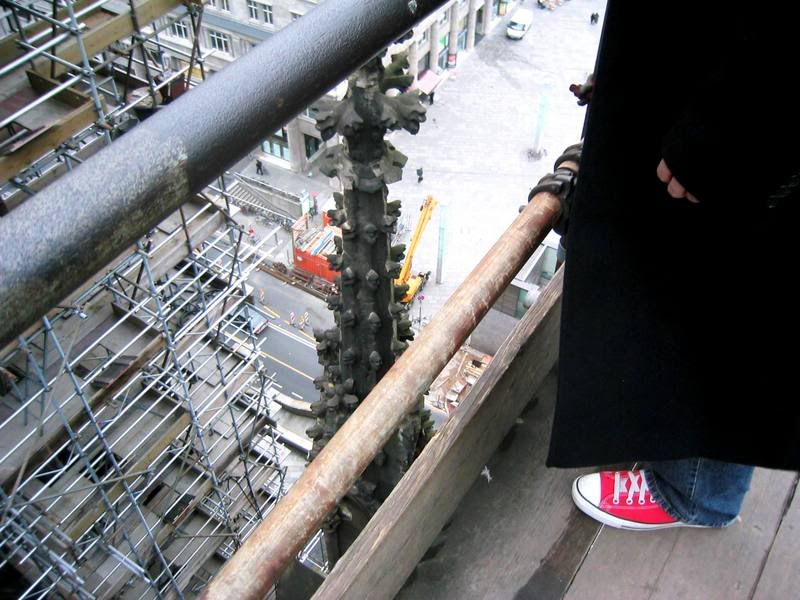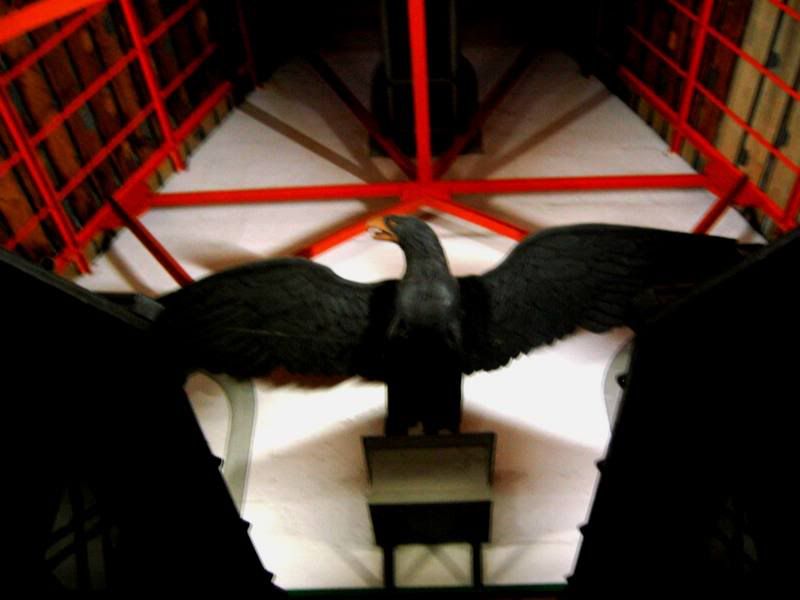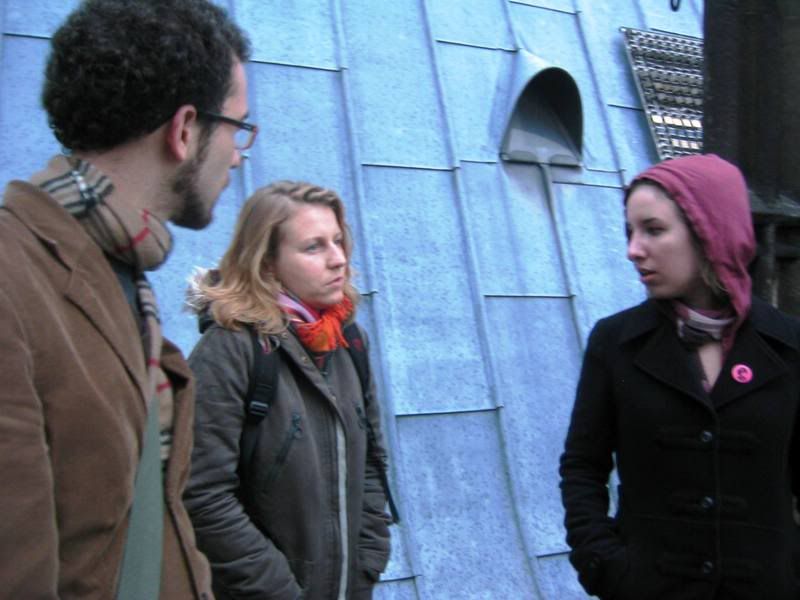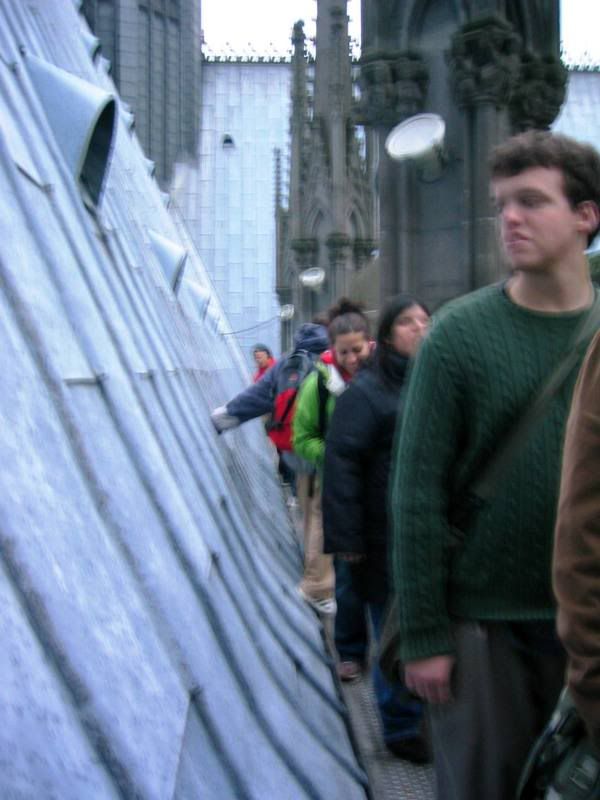An Interview With My Heroes
South Park Libertarians
Trey Parker and Matt Stone on liberals, conservatives, censorship, and religion.
IN LATE AUGUST Reason hosted a three-day conference in Amsterdam dedicated to exploring the future of free expression and free markets in Europe. The opening evening featured a conversation with Trey Parker and Matt Stone, the co-creators of the highly controversial and massively successful TV show South Park, now in its 10th season on Comedy Central. What follows is an edited transcript of the discussion with Parker and Stone, who were interviewed by Editor-in-Chief Nick Gillespie and Managing Editor Jesse Walker. Responses can be sent to letters@reason.com.
 Good evening, everyone, I’m Nick Gillespie of Reason magazine. What Jesse Walker and I are going to be doing tonight is talking with Matt Stone and Trey Parker about South Park and their other creative endeavors, including 2004’s wonderful puppet epic Team America, which was not only the first full-length movie performed by wooden actors since Charlton Heston retired from the screen but the most profound discussion of U.S. foreign policy and the War on Terror to come out of Hollywood. Or Washington, for that matter.
Good evening, everyone, I’m Nick Gillespie of Reason magazine. What Jesse Walker and I are going to be doing tonight is talking with Matt Stone and Trey Parker about South Park and their other creative endeavors, including 2004’s wonderful puppet epic Team America, which was not only the first full-length movie performed by wooden actors since Charlton Heston retired from the screen but the most profound discussion of U.S. foreign policy and the War on Terror to come out of Hollywood. Or Washington, for that matter.
As most of you know, South Park, now finishing its first decade at Comedy Central, follows the misadventures of four grade-school boys in the mythical town of South Park, Colorado, a Brigadoon of small-town depravity, degradation, and good old American values. I suspect that South Park will prove every bit as long-lived in the American subconscious as Mark Twain’s Hannibal, Missouri, or Laura Ingalls Wilder’s prairie.
 South Park has set many records during its run. For instance, the 2001 episode “It Hits the Fan” broke the swearing record on TV by having characters use the word shit a total of 162 times in a half-hour, thereby beating the previous record holder, Chicago Hope, which had used the word once in an hour-long show. South Park has received innumerable awards and nominations, most recently a George Foster Peabody Award, given annually for excellence in television and radio programming. Yet I suspect that Matt and Trey’s greatest honor was being nominated for an Oscar for Best Song, “Blame Canada,” from their 1999 film South Park: Bigger, Longer, and Uncut, and then losing to Phil Collins’ “You’ll Be in My Heart” from Tarzan.
South Park has set many records during its run. For instance, the 2001 episode “It Hits the Fan” broke the swearing record on TV by having characters use the word shit a total of 162 times in a half-hour, thereby beating the previous record holder, Chicago Hope, which had used the word once in an hour-long show. South Park has received innumerable awards and nominations, most recently a George Foster Peabody Award, given annually for excellence in television and radio programming. Yet I suspect that Matt and Trey’s greatest honor was being nominated for an Oscar for Best Song, “Blame Canada,” from their 1999 film South Park: Bigger, Longer, and Uncut, and then losing to Phil Collins’ “You’ll Be in My Heart” from Tarzan.
South Park is many things. First and foremost, it is scabrously funny and antinomian, taking laser-guided aim at targets ranging from the ridiculous—one episode mocked George Lucas’ and Steven Spielberg’s intentions to change the first Raiders of the Lost Ark movie for DVD release—to the sublime: In one particularly memorable episode from the first season, the South Park boys battle a Godzilla-like version of Barbra Streisand with the aid of Sidney Poitier, film critic Leonard Maltin, and rock star Robert Smith of The Cure. (After that episode, by the way, Streisand attacked the show, not for showing her as a monster but for promoting cynicism among children.)
More commonly, though, the show takes on serious topics in a hilarious manner. These include idiotic sex and drug education programs foisted on kids who are smarter, or at least more sensible, than their parents and teachers, and moral panics over everything from video games to gay sex to environmental degradation. A recent episode featured former Vice President Al Gore dragging the town along on a feverish hunt for a mythical “ManBearPig.” Another episode warns of a “smug alert” emanating from Hollywood after George Clooney’s self-congratulatory speech at last year’s Oscars. Simply put, for the last decade, South Park has produced the sharpest satire of American politics and culture.
Tonight we’ll talk to Trey and Matt about what it’s like to take on the politics and attitudes of their peers in Hollywood, what their own politics are, and where those politics came from.
We’ll also talk to them about religion. If lampooning self-important, self-indulgent celebrities—and it’s not clear there is any other kind—is one constant on the show, so is skewering religious hypocrisy and extremism. In various episodes, Trey and Matt have taken on aspects of Judaism, Christianity, and Islam, and a conspicuously gay Satan is one of the more sympathetic characters in the South Park movie. Perhaps even more dangerously, they have made fun of the Church of Scientology, a group that may not be as thick with suicide bombers as Islam but is certainly better represented by lawyers.
 Yet South Park’s treatment of religion, like its treatment of politics, is never simplistic, stupid, or uninformed. Indeed, Matt and Trey’s 1997 movie Orgazmo, which centers around a young Mormon missionary who ends up taking on the role of a superhero porn star, clearly reflects not only a great deal of knowledge of the Latter-day Saints but some real affection for the group.
Yet South Park’s treatment of religion, like its treatment of politics, is never simplistic, stupid, or uninformed. Indeed, Matt and Trey’s 1997 movie Orgazmo, which centers around a young Mormon missionary who ends up taking on the role of a superhero porn star, clearly reflects not only a great deal of knowledge of the Latter-day Saints but some real affection for the group.
We’re going to open things up, though, with a discussion of free speech and censorship issues. Never before in human history have we been more free to express ourselves, and never before have the opponents of free speech been more vocal and, in some instances, deadly.
In the United States, we’ve seen continuing and ramped-up attempts to extend government regulation of speech to cable and satellite TV and radio and to increase restrictions on unambiguously political speech via campaign finance “reform.” In Europe, we’ve witnessed the rise not only of laws designed to spare the feelings of certain groups by shutting down “offensive” speech but death threats and actual murders of people who refuse to be silenced. One of the reasons we were interested in having a conference in Amsterdam is that it’s not only the birthplace of tolerance but the site of one of the most brutal crimes related to free speech in recent memory: the 2004 murder of Dutch filmmaker Theo Van Gogh, who was stabbed to death in the street after making a 10-minute film critical of Islam’s treatment of women.
So let’s start off with a discussion of two recent episodes. In the wake of the violent reaction to the Muhammad cartoons that appeared in the Danish newspaper Jyllands-Posten, you wrote a story in which the Prophet appeared on the cartoon series Family Guy. Comedy Central refused to air the scene in which Muhammad actually appeared. You also recently produced an episode mocking Tom Cruise and Scientology, which the network refused to rerun earlier this year.
So the first question is, what’s more terrifying, crossing Islam or crossing Scientology?
 Trey Parker: They’re really the same people.
Trey Parker: They’re really the same people.
This is what happened. I was on my honeymoon in Disney World. I turned on the television, and there were thousands of rioting Muslims, and the caption said, “Muslims enraged over cartoon.” And I said, “Oh, shit. What did we do?”
We actually did an episode five years ago with Muhammad in it. It was an episode called “Super Best Friends,” and Muhammad had super powers and turned himself into a beaver and then killed Abraham Lincoln. I thought, “They finally just saw it, and they’re all pissed off.” But no, it was those other cartoons that they were mad about.
So Matt and I were like, “This is great; we have our first episode.” Comedy Central kept saying, “We’re not going to broadcast a Muhammad episode.” And we said, “You totally have the right, it’s your network, but we’re going to make one, and it’s going to be one of the seven you pay for.”
Matt Stone: And then we made it two episodes out of seven.
It was life imitating art, because the whole week after the first one aired there was a teaser, “Will television executives take a stand for free speech? Or will Comedy Central puss out?” That whole week we were trying to get Comedy Central to show Muhammad. And they pussed out.
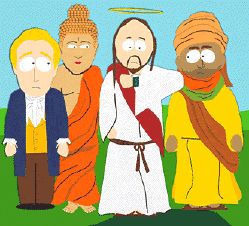 Reason: They did show most of the episode, but they blocked out the specific moment when Muhammad appears. I know people who assumed you decided to run those title cards yourself, as part of the satire: “In this shot, Muhammad hands a football helmet to Family Guy. Comedy Central has refused to broadcast an image of Muhammad on their network.”
Reason: They did show most of the episode, but they blocked out the specific moment when Muhammad appears. I know people who assumed you decided to run those title cards yourself, as part of the satire: “In this shot, Muhammad hands a football helmet to Family Guy. Comedy Central has refused to broadcast an image of Muhammad on their network.”
Stone: It was really hard to come up with the right approach. What do you do other than just put black and white cards up to say this isn’t us, the network really wouldn’t show this image, they really have been bullied into this? We toyed with the idea of putting some really incredible quote up or making a big speech. At the end of the day it felt a little too high and mighty, so we ended up doing the driest thing possible.
Reason: Do you find yourself facing more restrictions on what you can do now or when you started out?
Parker: It started last Christmas when we did an episode—it was really an episode about alcoholism, but it happened to have a statue of the Virgin Mary shitting blood on the Pope.
Stone: So it wasn’t really about that.
 Parker: Yeah. It was really saying these things about A.A., but that was the first episode that a Catholic group got really upset about, and Comedy Central pulled it [from the rerun schedule]. We were like, “Wow, that’s never happened.” Then a few months after that, suddenly they were pulling the Tom Cruise episode.
Parker: Yeah. It was really saying these things about A.A., but that was the first episode that a Catholic group got really upset about, and Comedy Central pulled it [from the rerun schedule]. We were like, “Wow, that’s never happened.” Then a few months after that, suddenly they were pulling the Tom Cruise episode.
On one hand, we ’re thinking, “We’re living in a pretty different time now. All this stuff’s getting pulled off the air.” On the other hand, we’re thinking, “Well, the Virgin Mary is shitting blood on the Pope.”
Stone: Our point was that if you’re going to pull this off for offending somebody, you don’t have any episodes of South Park left. Somebody will complain about every single episode.
Reason: When it looked like Comedy Central wasn’t going to rerun the Mary episode, people were still able to download it illegally online. Did you see that as a victory for free speech, or did you think, “My God, these people are stealing our intellectual property”?
Stone: We’re always in favor of people downloading. Always.Reason: Why?
Stone: It’s how a lot of people see the show. And it’s never hurt us. We’ve done nothing but been successful with the show. How could you ever get mad about somebody who wants to see your stuff?
Parker: We worked really hard making that show, and the reason you do it is because you want people to see it.
Reason: How did other people in the creative community respond to your recent controversies?
Parker: When we did the Muhammad episode, we got flowers from the Simpsons people because we ripped on Family Guy. Then we got calls from the King of the Hill people saying, “You’re doing God’s work ripping on Family Guy.” Even though it was this big political thing about Muhammad and whatever, everyone was just, “Thank you for you ripping on Family Guy.”
Reason: Are you secretly hoping that radical Islamists, who are not always the closest readers of texts, will actually think Family Guy ran an episode showing Muhammad?
Stone: Well, that’s the other big joke. We really weren’t that brave. If it did make it over to some obscure part of Pakistan, they’d be like, “Hey, we ought to kill the guys who did Family Guy.”
Reason: In the climactic scene of the episode, Kyle lectures the president of Fox that he has to stand up in favor of free speech. Is it true that the dialogue was taken directly from the conversations you had with Comedy Central about showing Muhammad?
Parker: Yes, the dialogue is almost exactly the same. We even had Kyle call him Doug, right?
Stone: Doug Herzog is the head guy over at Comedy Central.
Parker: It was very personal.
Stone: At some point I think we knew we were going to lose. We weren’t going to get Muhammad on, so we were just going to make them feel really bad about it. I mean, we’ve been at an ACLU meeting where we gave Doug an award for freedom of speech, and once you get an award for freedom of speech, you’ve got to step up to the plate.
 Reason: Talk a little bit about Tom Cruise and the Scientology episode.
Reason: Talk a little bit about Tom Cruise and the Scientology episode.
Parker: The quick summary is that one of the little boys, Stan, is told he should take a personality test by these people hanging out near the mall. He takes the test, and they inform him that he’s really, really unhappy, which he didn’t realize, and so they tell him all the steps he needs to go through to learn about Scientology. But then they have him do that thing they do in Scientology where they take your electrode readings and take you back in your childhood. He does that, and they realize his readings are so over the top that he must be the reincarnation of L. Ron Hubbard, so now he’s actually not just in the cult; he’s leading the cult. So everyone’s descending on South Park, and of course Tom Cruise comes as well, wanting his approval.
Reason: How did the network respond to pressure from the Church of Scientology about that episode?
Stone: They blew it off. To be fair, it wasn’t really at the Comedy Central level. It was way up at the Viacom level. [Viacom owns Comedy Central.] It wasn’t a choice or anything we had any say in. The only thing that we got was a phone call saying that the producers of Mission Impossible: 3 [which stars Cruise] want this show off the air.
This was on a Wednesday. The rerun was supposed to air that night. So we bitched and moaned and yelled at them on the phone, and they said, “You may be mad about that, but what you’re really going to be mad about is we don’t want you to go to the press and say anything.” That was really tough, because that felt like we were playing along with this, to me, fundamentally immoral organization like Scientology. But then we realized —and luckily it came true—that you can’t just pull an episode off the air anymore. People are going to find out. Sure enough, it was all over the press. The Internet makes those backroom deals a lot harder to do.
Reason: You have a money-making franchise, and you’re built into a large multinational corporation’s distribution channel. Do you feel more worried when you do something that might rock the boat?
Parker: This last year has been a really amazing year. We’ve suddenly found ourselves back in the headlines again because of the shows we were doing. It wasn’t an intentional thing. It was just that we’ve reached that level now where we’re very comfortable saying, “You know what? We’re done. We’ve made all the money we need, and we both have always had dreams of doing other things.” As soon as they say, “We’re not going to let you do a Muhammad episode,” we can say, “All right, well, we’re not going to do any more shows for you this season.”
Stone: They were really bummed out when we called them and said we’re going to do a Muhammad episode. They’re like, “Ahh, fuck. Oh my God, you guys.” Because they can’t tell us no. A smaller show, they would’ve just said, “No, you can’t do it. End of story.” And a bigger show like The Simpsons wouldn’t dare risk their franchise. It’s such a stupid political move, but we’re just stupid enough to do it.
Reason: This is a bizarre time to be alive. You have places like YouTube, where you can create whatever you want and disseminate it. At the same time, you have lawsuits, and you have people literally being killed. So what’s the state of free expression?
Stone: We obviously have a very one-sided view of it. Basically all we’ve ever done is said what we wanted to say, and people have just thrown money at us. We would love to be very Michael Moore and go out there and go, “Yeah, they’re trying to quiet us.” Because that immediately gets people on your side.
People ask, “So how is it working for a big multinational conglomeration?” I’m like, “It’s pretty good, you know? We can say whatever we want. It’s not bad. I mean, there are worse things.” It doesn’t mean that we don’t have battles like we did this year, where you get really frustrated with the fact that Mission Impossible:3’s bigger than South Park and they can shut you down, but at the end of the day you’ve got to look at the balance sheet.Parker: At the end of the day, they gave us $40 million for a puppet movie.
Reason: You did an episode where the boys encountered the Knights of Standards and Practices, who explained why they shouldn’t say shit on television. At face value, that story seems to say that there are proper limits to what you can put on TV. Are there limits that you won’t cross?
Parker: Totally. But year after year, it’s always a different thing. When we look at the shows we were doing years ago—to think that people were freaking out over these episodes! If you look at our first season now, you could put it on PBS next to Sesame Street.
Stone: They’re like cute little Teletubbies.
Parker: They’re just cute little kids. “Oh, he’s farting fire, that’s cute.”
It’s not that every year we get together and go, “How can we push it more?” But the boundaries are part of the fun, and the fact that it’s on television is part of the fun of what we’re getting away with.
Stone: And then, when we did the South Park movie, we changed what the limits were because they’re different for movies than for TV.
Reason: In the episode “All About Mormons,” a Mormon family moves to South Park, and one of the boys finds out that they’re pretty nice. Then they have a fight, and at the end the Mormon boy teaches him a moral lesson: “Look, maybe us Mormons do believe in crazy stories that make absolutely no sense, and maybe Joseph Smith did make it all up, but I have a great life and a great family and I have the Book of Mormon to thank for that. The truth is, I don’t care if Joseph Smith made it all up, because what the church teaches now is loving your family, being nice, and helping people, and even though people in this town might think that’s stupid, I still choose to believe in it. All I ever did was try to be your friend, Stan, but you’re so high and mighty you couldn’t look past my religion and just be my friend back. You’ve got a lot of growing up to do, buddy. Suck my balls.”
You’re known for lampooning religion. That clip suggests you see a lot of value in it as well. How does that balance for you?
Parker: I’ve been fascinated with the Mormons for a long time. They are the nicest people in the world. If a religion’s going to take over the world, and the one that really believes “just be super nice to everyone” takes over, that’s all right with me. Even if it’s all bullshit, that’s OK.
Reason: How were each of you raised religiously?
Stone: I was raised agnostic. There was no religion in my house.
Parker: I was pretty much the same. My father tried to raise me Buddhist, as in Alan Watts Buddhism, which is Buddhism in a way.
Reason: I have Mormon friends who are convinced you guys were raised Mormon, because of some of the references in the show.
Parker: Well, we grew up in Colorado. Colorado’s right next to Utah—you know, Mormon Central. My first girlfriend was Mormon, and I went to experience family home evening at her house for the first time. “What are you all doing?” “We’re sitting, and we’re singing songs and playing games together.” I was like, “Boy, that’s fucked up. Families are not supposed to be doing that.”
Reason: There are also a lot of Jewish references. There’s a whole episode about going to Jewish camp, where they do silly craft projects. Did you go to a Jewish camp?
Stone: No, no. I didn’t even know I was Jewish until I was 16.
Parker: I had to teach him the dreidel song.
Stone: I’m not a very good Jew.
I think we’ve always had religion in the show because it’s just funny. I mean, there’s just a lot of funny stuff. We’ve done stuff that’s really anti-religion in some ways. But it’s such an easy joke to go, “Look how stupid that is,” and then stop right there. Religion’s just much more fascinating than that to us. So from the very beginning, we always thought it was funny just to flip it on its ear and show how screwed up it is, but also how great it is. People couldn’t tell if we were kidding.
Reason: What was the response to the Mel Gibson episode you did in 2004? In “The Passion of the Jew,” two of the boys feel cheated after paying to see The Passion of the Christ, visit Gibson in his Malibu mansion, and demand a refund. You portray Gibson as generally paranoid, raving, and insane.
Parker: It was way ahead of its time, I’ll tell you that. Years ago we had Mel Gibson drunk, getting arrested by a cop, and smearing shit on stuff. That totally came true.
Reason: A few years ago, Matt, you said, “I hate conservatives, but I really fucking hate liberals.” Who do you hate more these days?
Stone: That’s a tough question. Obviously, South Park has a lot of politics in it, but ultimately we want to make a funny show and a good show. We try not to be, “All right, here’s the point we want to make.” But things like California’s smoking ban and Rob Reiner animate both of us. When we did that Rob Reiner episode [2003’s “Butt Out”], to us it was just common sense. Rob Reiner was just a great target.
That’s when a lot of people started calling us conservative: “How could you possibly rip on Rob Reiner? You must be conservative.”
Parker: A big key to us is that we both grew up in Colorado in the ’80s, and we wanted to be punk rockers. When you were a teenager in Colorado, the way to be a punk rocker was to rip on Reagan and Bush and what they were doing and talk about how everyone in Colorado’s a redneck with a gun and all this stuff. Then we went to the University of Colorado at Boulder, and everyone there agreed with us. And we were like, “Well, that’s not cool, everyone agrees with us.” And then you get to Los Angeles. The only way you can be a punk in Los Angeles is go to a big party and go, “You can say what you want about George Bush, but you’ve got to admit, he’s pretty smart.” People are like, “What the fuck did he just say? Get him out of here!”
Reason: So what is it that you hate about liberals? Can you boil it down to a consistent impulse, and then a consistent impulse among conservatives?
Parker: Wow, that’s a good question.
Stone: I’ve never thought about that.
 Parker: To some degree, South Park has a simple formula that came from the very first episode [“The Spirit of Christmas,” which featured Jesus and Santa fighting over who owned the holiday]. There was Jesus on this side and there was Santa on this side, there’s Christianity here and there’s Christmas commercialism here, and they’re duking it out. And there are these four boys in the middle going, “Dude, chill out.” It’s really what Team America is as well: taking an extremist on this side and an extremist on that side. Michael Moore being an extremist is just as bad, you know, as Donald Rumsfeld. It’s like they’re the same person. It takes a fourth-grade kid to go, “You both remind me of each other.” The show is saying that there is a middle ground, that most of us actually live in this middle ground, and that all you extremists are the ones who have the microphones because you’re the most interesting to listen to, but actually this group isn’t evil, that group isn’t evil, and there’s something to be worked out here.
Parker: To some degree, South Park has a simple formula that came from the very first episode [“The Spirit of Christmas,” which featured Jesus and Santa fighting over who owned the holiday]. There was Jesus on this side and there was Santa on this side, there’s Christianity here and there’s Christmas commercialism here, and they’re duking it out. And there are these four boys in the middle going, “Dude, chill out.” It’s really what Team America is as well: taking an extremist on this side and an extremist on that side. Michael Moore being an extremist is just as bad, you know, as Donald Rumsfeld. It’s like they’re the same person. It takes a fourth-grade kid to go, “You both remind me of each other.” The show is saying that there is a middle ground, that most of us actually live in this middle ground, and that all you extremists are the ones who have the microphones because you’re the most interesting to listen to, but actually this group isn’t evil, that group isn’t evil, and there’s something to be worked out here.Except when it comes to Scientologists. They’re all fucked up.
Reason: Why is Hollywood so overwhelmingly liberal? Or maybe not even liberal. It seems that many entertainment industry people really want to control people on very specific issues.
Parker: It’s so simple to understand. It’s just that that’s what’s cool right now. That’s what’s cool in L.A., so that’s what everyone does.
Stone: Yeah, I think they just think it’s cool. I think a lot of them really believe in what they’re doing. It’s not like it’s some kind of conspiracy. There’s something about people who become actors that they also become liberals. That being said, in Team America, we said exactly what we wanted to say and in South Park, we say exactly what we want to say. No one tells us what to say, so we may have differing political viewpoints, but they just want to make money, you know? And there’s something kind of beautiful about that.
Reason: Each of you at various points have called yourself libertarian. Is that an apt description?
Parker: People started throwing that word around to describe us right around the second or third season. They would sit us down and go, “So are you libertarian?” And I would always say, “I don’t know, am I? You’ve seen my stuff.”
I still don’t really know the answer to that question. I think I am, though.
Stone: I think it is an apt description for me personally, and that has probably seeped into the show. But we never set out to do a libertarian show.
Reason: When you say libertarian, what do you mean?
Stone: I had Birkenstocks in high school. I was that guy. And I was sure that those people on the other side of the political spectrum were trying to control my life. And then I went to Boulder and got rid of my Birkenstocks immediately, because everyone else had them and I realized that these people over here want to control my life too. I guess that defines my political philosophy. If anybody’s telling me what I should do, then you’ve got to really convince me that it’s worth doing.




